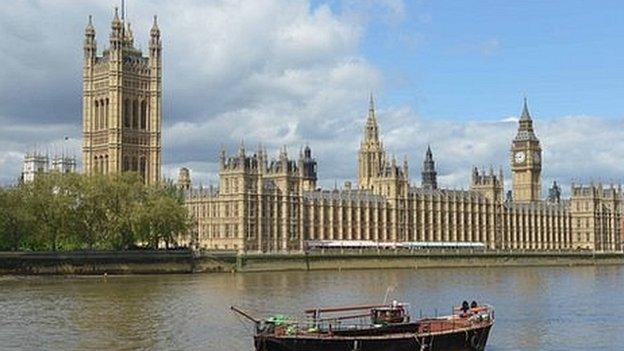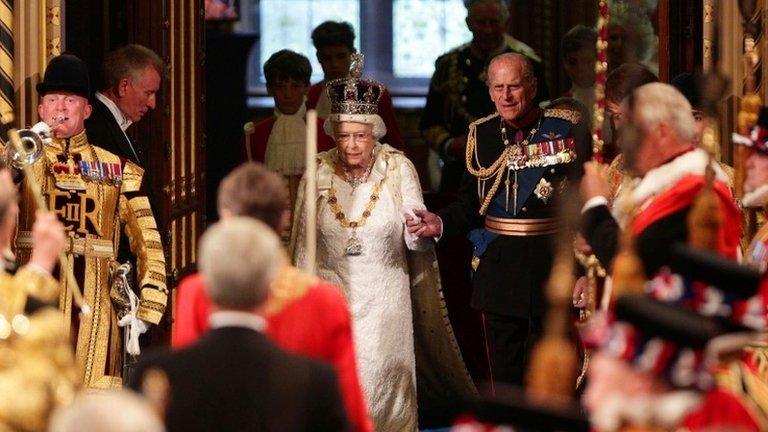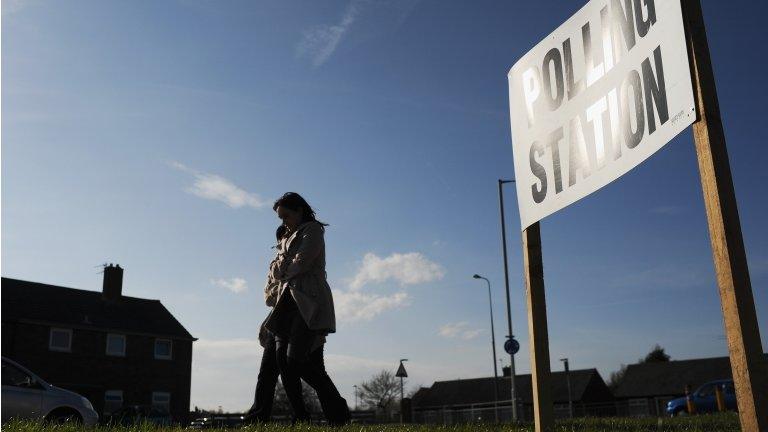Voters 'duped over recall bill', says Zac Goldsmith
- Published
Zac Goldsmith: "It's worse than meaningless, it's a pretence"
Plans to give voters the power to kick out MPs who break the law have been branded "meaningless" by a Tory MP.
Zac Goldsmith said voters had been "duped" by ministers who claim the recall bill will allow misbehaving MPs to be removed from their job.
He said he planned to work with opposition parties to amend the legislation to give it more teeth.
The bill was included in the Queen's Speech after years of delays and wrangling between coalition ministers.
Asked if the government was open to amendments to the bill, the prime minister's official spokesman said the government had already consulted on the proposals and the "intention" was to get it into law before next year's election.
Under the Recall of MPs Bill, constituents will be able to sack their MP if they are sentenced to up to 12 months in jail.
Petition
Voters could also trigger a by-election if the House of Commons resolves that an MP has engaged in "serious wrongdoing". A by-election would be forced if more than 10% of constituents signed a petition over an eight-week period after the Commons ruled an MP could face recall.
MPs are now only expelled from Parliament if they are jailed for more than one year. Less serious wrongdoing is punished by temporary suspension from the House.
The government said the move would give constituents a direct voice when MPs have behaved badly - but Mr Goldsmith said the final say would still rest with a committee of MPs, meaning it would not be true recall as it is understood in other countries.
"The criteria are so narrow that it's virtually meaningless. It will be impossible to recall anyone.
"So the danger is, and it really is a danger I think, particularly on the back of this huge UKIP vote we saw last week, is that people will discover at the very first scandal that they've been duped, that they have no more power after this bill goes through than they do today."
'Hounded out'
But Business Minister Michael Fallon said the proposals would improve on the current situation.
"Obviously if they behave really badly and commit a criminal offence you have to have a mechanism to get them out of Parliament," he told the BBC News Channel.
"But we have to protect MPs from being recalled by people who just disagree with them...What you have to ensure is an MP can't be hounded out just because people disagree with them back in their constituency."

At the moment, MPs can only be expelled if they are sentenced to jail for more than a year
Lib Dem MP Tim Farron said the bill had only survived because his party had "made a fuss" about it.
"It is far better to have a imperfect recall bill in there that we can amend and improve, than not to have one at all," he said.
But UKIP said the proposed new law illustrated the growing gap between politicians at Westminster and the people they are meant to represent.
UKIP's head of policy Tim Aker said: "The decision to only offer recall voting on a signed-off-by-Parliament-basis reflects a political class that does not know, does not trust and certainly does not represent its people."
Campaign group Unlock Democracy said voters risked being "left in the cold" under the proposals.
"The government's watered down version of recall risks creating the illusion that people will have a say in recalling their elected representative while ensuring that this will probably never happen in practice," its director Alexandra Runswick said.
In the 2010 coalition agreement, ministers promised "early" legislation to allow constituents to sack their MPs as part of moves to restore faith in politics after the 2009 expenses scandal.
But the plans appeared to have been killed off earlier this year when the Liberal Democrats accused the Conservatives of scuppering the measure. Prime Minister David Cameron later declared his intention to revive the plans in the wake of fresh anger over the behaviour of MPs.
- Published4 June 2014

- Published14 February 2014
